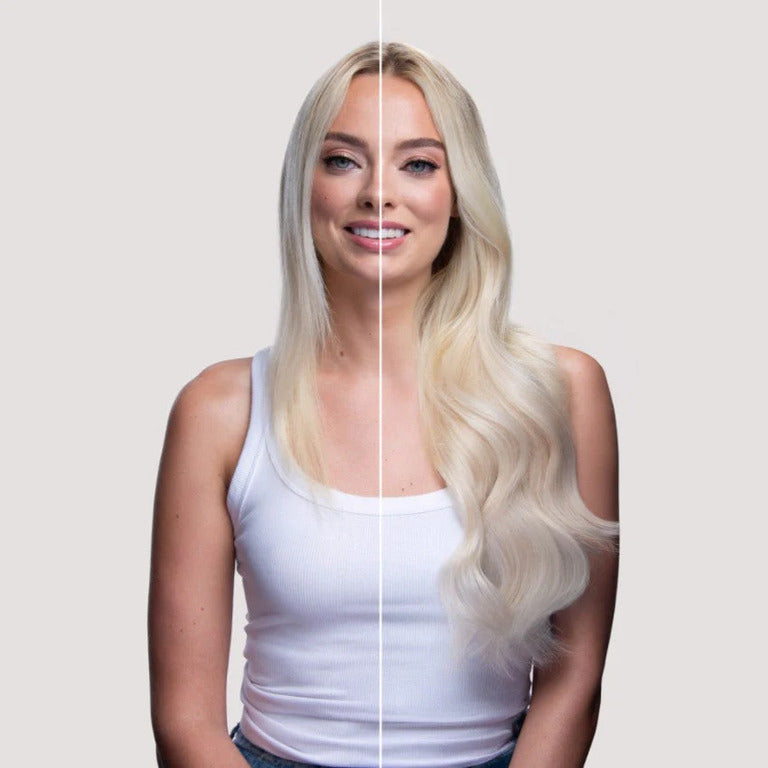How to Use Rosemary Oil for Hair Growth
by BRENDA L. / 25. NOV 2022

Reading Time: 7 Minutes
Index
In the TikTok era, it’s easy to fall for tips and tricks that seem “too good to be true,” especially when it comes to hair extensions and beauty secrets that can easily become deceiving with the aid of good editing and filters. The latest question in haircare remains on everyone’s lips: is rosemary oil good for hair? Praised worldwide for its hair growth-related properties, is it fact or myth? Let’s find out together!
Understanding how to use rosemary oil for hair can help you make the most of its potential benefits. Some people mix it with a carrier oil and massage it into the scalp to promote circulation, while others add a few drops to their shampoo or conditioner. For more tips on using hair oils effectively, explore this guide on everything you need to know about hair oils and extensions. With a bit of experimentation, rosemary oil might just become a staple in your hair care routine.
Rosemary Oil For Hair: Truth Or Hoax?
Before becoming a staple in fancy hair care routines, rosemary is a culinary and healing herb. Native to the Mediterranean region, the history between rosemary-based products and humans dates to centuries and centuries ago. Rosemary is well known for its charming aroma; and on top of that, rosemary is a perennial plant, fairly easy to grow in your backyard.
Rosemary oil is known for its antioxidant and anti-inflammatory properties; just like peppermint essential oil, rosemary is said to promote blood circulation. This claim supports the idea of hair growth benefits. But is it true?
Studies support the use of rosemary essential oil, as one of the active ingredients in the plant is carnosic acid - a substance capable of promoting tissue and nerve healing. This ability to heal nerve endings may be beneficial to the nerves in your scalp too, resulting in possibly restoring hair growth.
Does Rosemary Oil Help Hair Growth?
Whilst there is a lot of anecdotal evidence behind many of these miraculous claims, rosemary has been used by many to promote hair growth successfully. Using rosemary essential oil could actually work for you!
Rosemary essential oil needs to be studied more, but many already swear by it for different reasons.
Strengthens Hair
Because of its positive influence on the hair follicles, hair looks and feels denser, shinier and generally healthier.
Promotes Scalp Health
Rosemary oil has natural anti-inflammatory properties, and its richness in carnosic acid makes it the perfect ingredient if you need highly restorative power for your skin to reduce scalp irritation.
Can Prevent Dandruff
Thanks to its properties, rosemary essential oil can promote hair follicles’ health and combat fungal dandruff.If you suffer with dandruff and want to try Rosemary Oil, we advise to use it as a treatment rather than leaving it on the scalp as this could create product build-up. You could try massaging it into the scalp before washing and leave on for no longer than 60 minutes. Wash and rinse your hair as normal to remove the residue and repeat every 2-3 washes to test the effectiveness.
Read more about this topic in our "how to get rid of dandruff" blog.
Who Can Use Rosemary Oil On Hair?
Generally speaking, it’s safe to say that rosemary oil can be used on all hair types, including colour-treated hair. As with any hair oil, if your tresses are naturally thin, please be aware that rosemary oil may weigh your hair down. Rosemary oil can be used for the most hair and scalp types; however, those with oily hair or those with damaged hair, breakage, and who are experiencing some forms of thinning hair or loss are the ones most likely to see any significant improvement/change in their manes. Always remember that consistency is the key to see positive results over time.
Find out more about the best oils in ourBest Oils For Hair Growth and a Healthy, Happy Scalp blog.
Where To Buy Rosemary Oil For Hair
Rosemary essential oil can be bought at your local botanical shop, Amazon, and - if you’re located in the US or Canada - at Walmart too. If you don’t have one already, remember to purchase a carrier oil as well, as using pure essential oils on your skin and scalp can be irritating. I personally like to use castor oil; coconut oil is another valid option, depending on your scalp and hair type.
How To Make Rosemary Oil For Hair At Home
If you don’t feel like shopping for fancy, pre-bottled rosemary essential oil, you can make it in the comfort of your own home.
You will need:
- Three or four sprigs of fresh rosemary
- Two cups (475 ml) of oil (olive oil, jojoba oil, or sweet almond oil)
Next, follow these simple steps:
- Wash the fresh rosemary under cold, running water. Make sure you remove any dirt and debris.
- Remove the leaves from the stem and measure out about a cup of leaves.
- Fill a small saucepan with oil (two cups).
- Add the rosemary sprigs to the saucepan and keep the heat on low.
- Heat the rosemary for five to ten minutes, stirring constantly. As the oil warms up, it will begin to smell like rosemary. Make sure the oil doesn’t start bubbling; if this happens, your heat settings are still too high.
- Strain and cool the oil.
- Once the oil has cooled to room temperature, it can be poured into a clean bottle. Label the bottle with the bottling date and the ingredients used.
- Refrigerate the oil you’re not using; this should be used within a week before being discarded.
Please be mindful, if you’re using jojoba oil or sweet almond oil in your recipe instead of olive oil, the product won’t be edible and will need to be used exclusively on your hair.
How To Use Rosemary Oil For Hair
Using rosemary oil for your hair is quite easy, and there are several ways to implement it into your hair care routine. Here’s how.
Rosemary Oil Treatment
Combine rosemary oil with your favourite carrier oil, such as castor, sweet almond, argan, jojoba or coconut. Apply to the scalp and massage it into your scalp using your fingertips. This type of treatment works best overnight, as it’s recommended to sit on your scalp for around six hours.
Rosemary Oil Infusion
You can add a few drops of rosemary oil to your conditioner whilst washing your hair; this is not as effective as an overnight oil treatment, but can still work some magic if you’re in a hurry.
Buy Rosemary-based Premade Products
If you’re not a fan of DIY and don’t feel comfortable messing around with essential oils and carrier oils, you can always let the matter be taken in the hands of established hair experts. Well–known brands have developed their own products working with rosemary essential oils extracts, such as AVEDA’s rosemary mint purifying shampoo.
How To Dilute Rosemary Oil For Hair
Diluting your essential oil into your carrier oil is extremely easy. According to experts, the ideal ratio is 15 drops of rosemary oil for every 6 teaspoons of your carrier oil of choice.
Best Rosemary Products For Hair
As mentioned before, there are quite a few hair products that started involving rosemary extracts and essential oils in their recipe for a healthy, gorgeous mane. Here’s a few examples that you can experiment with!
Allpa Botanicals Rosemary Hair Oil
The perfect pre-bottled rosemary essential oil to massage in your scalp and give your head a spa treatment; natural rosemary fragrance that helps soothe an irritated scalp and give some TLC to your follicles.
Mielle Rosemary Mint Strengthening Hair Masque
Usable on all hair types, curly and coarse-haired people are the ones who were impressed the most by this product.
First Botany Peppermint Rosemary Hair Regrowth and Anti Hair Loss Shampoo + Conditioner
This sulphate-free and alcohol-free formula is enhanced with essential oils to promote healthy hair growth and fight dandruff.
Conclusion:
While rosemary oil is widely praised for its hair growth properties, it's important to separate facts from myths and rely on well-researched information. Diluted rosemary oil for hair can be a great addition to your routine to get a healthy, strong and shiny mane. Although some more studies are needed to back up all the hype, rosemary oil has been proven effective for many people out there. By staying informed and making thoughtful choices, you can find the best hair care solutions for your needs. Happy exploring and caring for your hair!
Suchen Sie makelloses, salonwürdiges Haar, ohne die Bank zu sprengen? Bei Cliphair haben wir für Sie luxuriöse Clip-In-Haarverlängerungen für schnelle Transformationen und dauerhafte Haarverlängerungen für langanhaltenden Glamour. Extensions benötigen besondere Pflege und Wartung, um ihre Qualität zu erhalten. Deshalb haben wir alle erstklassige feuchtigkeitsspendende Haarpflegeprodukte erforderlich, um Ihren Stil auf den Punkt zu bringen.
Brauchen Sie den perfekten Farbton? Stöbern Sie durch unser komplettes Sortiment an Echthaar-Extensions in über 70 satten, seidigen Farbtönen oder schauen Sie sich unsere KOSTENLOSER Express-Farbabgleichservice um jedes Mal eine nahtlose Mischung zu gewährleisten.






